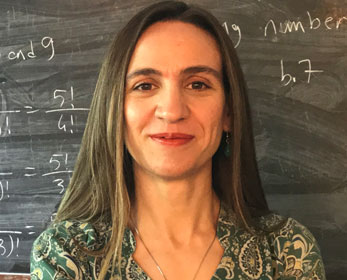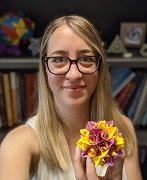No one knows better than a university that teaching is a complex task.
It takes a special combination of professional knowledge, motivation, and productive beliefs to become a good teacher.
What we want to know is how our teaching methods can ultimately lead to better student learning outcomes, which is the focus of new ECU research.
ECU researchers, mathematics educator Dr Vesife Hatisaru and mathematician Dr Julia Collins, have been conducting research into what are called 'teacher competencies' and how they ultimately impact on student learning outcomes in the field of mathematics.
Lecturer in Mathematics Education in ECU's School of Education, Dr Hatisaru explains when it comes to a subject such as mathematics, we face even more unique challenges in terms of student engagement and student anxiety, because mathematics has a wide range of applications and there are societal or parent expectations.
"Our research looks at the perceptions secondary mathematics teachers have of the professional knowledge they need as a teacher, and where they can source that knowledge (e.g., university studies, peer learning, self-study, books, professional development workshops/conferences, research studies, and so on)," said Dr Hatisaru.
"These are the perceptions that influence what professional learning decisions teachers make."
Perceptions of current and future teachers
In two related studies led by Dr Hatisaru, the research investigated the perceptions of future teachers (Hatisaru & Collins, 2023) and practising teachers (Hatisaru, 2023), asking them the following series of questions:
- 'what type of professional knowledge should a teacher of mathematics have'
- 'how important is it for teachers to have this knowledge'
- 'how do teachers continue to enhance their professional knowledge'; and
- 'how do they find out about their students’ strategies and understanding of a particular mathematical content'?
Findings show teachers in the classroom did place great emphasis on having professional knowledge to teach their subject; however, their perceptions of the knowledge they needed was relatively narrow – with little focus on extending their knowledge in the curriculum or materials or what was emerging on the mathematical horizon.
While future teachers mentioned postgraduate studies as a source of gaining professional knowledge, practising teachers made little reference to higher degree learning or educational research literature as a potential source of knowledge.
"These teachers emphasised collaborative learning, indicating that they found interacting with and learning from their peers as a more useful source of knowledge," said Dr Hatisaru.
"We know that Australian educational policy emphasises collaboration, so it is no surprise that current teachers are influenced by their educational context and choose to learn by collaborating with their colleagues – but this strategy can hardly replace learning by doing higher degree studies which is more common in some countries.
"In Finland, for example, current mathematics teachers must have at least a Masters' degree and this is considered one of the main contributory factors behind students' high academic performance."
Shifting perceptions
According to Dr Hatisaru, doing higher degree studies, such as a PhD degree, requires a significant commitment of time and money and support from your school principal, which not all teachers will have these resources.
"What's important is to look at how we shift those perceptions and then provide teachers with the support they need to engage in higher degree learning."
"If teachers do not view higher degree learning and research as sources of knowledge, or if they are less aware of the multi-dimensional aspect of teacher knowledge needed to teach mathematics effectively, then this will influence what professional development programs they will attend and what they will acquire from them."
Doctors Hatisaru and Collins explain this research highlights the importance of collaborations between a 'maths educator' and a 'mathematician' in terms of bringing diverse and commentary perspective in the field of mathematics education.
The heart of higher learning
"While collaborating with your peers is an incredibly important piece of the puzzle, it is not where you gain the most current scholarly knowledge produced in the mathematics education field," they believe.
"This key distinction goes to the heart of how we value higher learning in universities," said Dr Hatisaru.
"We would like to see a study done of the professional development opportunities available to mathematics teachers in Australia, to determine what gaps, if any, are there in professional development opportunities," said Dr Collins.
While this research looks at mathematics teaching, the findings give an interesting insight into how teachers' beliefs shape decisions about pursing higher learning at university.
This research was presented at the International MERGA conference (Mathematics Education Research Group Australia) and selected from more than 60 research papers as recommended reading for schoolteachers as a Quick Read for practitioners.
The paper was also published in Quadrante – an international research journal Published by the Portuguese Association of Mathematics Teachers – in their special issue focusing on beliefs in mathematics education.

 Teaching higher degree mathematics.
Teaching higher degree mathematics.




